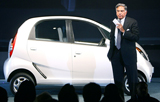Tata Motors said it will launch its ultra-cheap Nano car in Mumbai today — a vehicle meant to herald a revolution by making it possible for the world’s poor to purchase their first car.
But few predict the snub-nosed Nano will be able to turn around the company, which has been beset by flagging sales and high debt, anytime soon.
The Nano, which is priced starting at about 100,000 rupees (U$2,000), is a stripped-down car for stripped-down times: It is 3.1m long, has one windshield wiper, a 623cc rear engine and a diminutive trunk, the company Web site said.

PHOTO: AFP
It does not have air bags or antilock brakes — neither of which is required in India — and if you want air conditioning, a radio, or power steering, you’ll have to pay extra.
Tata Motors has been hard-hit by the global downturn. Commercial vehicle sales, its core business, have been decimated as India’s growth slows and consumers have had trouble getting affordable car loans.
The company declared a loss of 2.63 billion rupees for the October-to-December quarter, and it has been struggling to refinance the remaining US$2 billion of a US$3 billion loan it took to buy the Jaguar and Land Rover brands from Ford Motor Co in June.
Even the launch of the Nano has been scaled back.
The car is arriving six months late because of violent protests by farmers and opposition political party leaders over land, which forced Tata to move its Nano factory from West Bengal to the state of Gujarat.
Company officials have said it will take at least a year to complete the new factory and until then, Tata will only be able to produce a limited number of Nanos from its other car plants in India.
Tata Motors hasn’t yet given details on production volumes, but most analysts doubt the company will be able to make more than about 50,000 cars in the next year — a far cry from the 250,000 the company had planned to roll out initially.
Vaishali Jajoo, auto analyst at Mumbai’s Angel Broking, said even if Tata Motors manages to sell 250,000 Nanos a year, it would only add 3 percent to the company’s total revenues.
“That doesn’t make a significant difference to the top line. And for the bottom line, it will take five to six years to break even,” Jajoo said.
Still, in this new age of global thrift, the Nano sounds appealing to more than just the struggling farmers and petty businessmen across India that Tata initially had in mind for the car.
“What do you think the chances are that the Nano will come to America? Personally, I’d love one,” Steven Smith, whose first car was a Volkswagen Dune Buggy, wrote recently on the Nano Facebook page.
Tata Motors unveiled the Tata Nano Europa, a slightly more robust version of the Indian model, at the Geneva Motor Show this month, with a planned launch of 2011. But the company has no plans to bring the Nano to America anytime soon.

Nvidia Corp yesterday unveiled its new high-speed interconnect technology, NVLink Fusion, with Taiwanese application-specific IC (ASIC) designers Alchip Technologies Ltd (世芯) and MediaTek Inc (聯發科) among the first to adopt the technology to help build semi-custom artificial intelligence (AI) infrastructure for hyperscalers. Nvidia has opened its technology to outside users, as hyperscalers and cloud service providers are building their own cost-effective AI chips, or accelerators, used in AI servers by leveraging ASIC firms’ designing capabilities to reduce their dependence on Nvidia. Previously, NVLink technology was only available for Nvidia’s own AI platform. “NVLink Fusion opens Nvidia’s AI platform and rich ecosystem for

‘WORLD’S LOSS’: Taiwan’s exclusion robs the world of the benefits it could get from one of the foremost practitioners of disease prevention and public health, Minister Chiu said Taiwan should be allowed to join the World Health Assembly (WHA) as an irreplaceable contributor to global health and disease prevention efforts, Minister of Foreign Affairs Lin Chia-lung (林佳龍) said yesterday. He made the comment at a news conference in Taipei, hours before a Taiwanese delegation was to depart for Geneva, Switzerland, seeking to meet with foreign representatives for a bilateral meeting on the sidelines of the WHA, the WHO’s annual decisionmaking meeting, which would be held from Monday next week to May 27. As of yesterday, Taiwan had yet to receive an invitation. Taiwan has much to offer to the international community’s

CAUSE AND EFFECT: China’s policies prompted the US to increase its presence in the Indo-Pacific, and Beijing should consider if this outcome is in its best interests, Lai said China has been escalating its military and political pressure on Taiwan for many years, but should reflect on this strategy and think about what is really in its best interest, President William Lai (賴清德) said. Lai made the remark in a YouTube interview with Mindi World News that was broadcast on Saturday, ahead of the first anniversary of his presidential inauguration tomorrow. The US has clearly stated that China is its biggest challenge and threat, with US President Donald Trump and US Secretary of Defense Pete Hegseth repeatedly saying that the US should increase its forces in the Indo-Pacific region

ALL TOGETHER: Only by including Taiwan can the WHA fully exemplify its commitment to ‘One World for Health,’ the representative offices of eight nations in Taiwan said The representative offices in Taiwan of eight nations yesterday issued a joint statement reiterating their support for Taiwan’s meaningful engagement with the WHO and for Taipei’s participation as an observer at the World Health Assembly (WHA). The joint statement came as Taiwan has not received an invitation to this year’s WHA, which started yesterday and runs until Tuesday next week. This year’s meeting of the decisionmaking body of the WHO in Geneva, Switzerland, would be the ninth consecutive year Taiwan has been excluded. The eight offices, which reaffirmed their support for Taiwan, are the British Office Taipei, the Australian Office Taipei, the